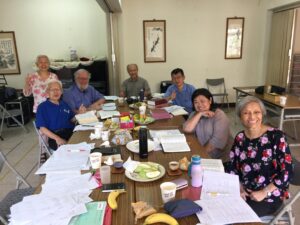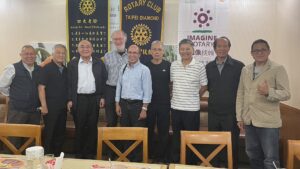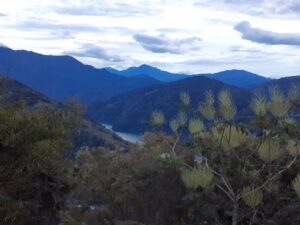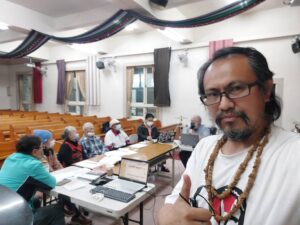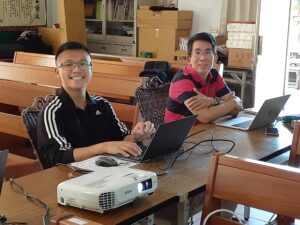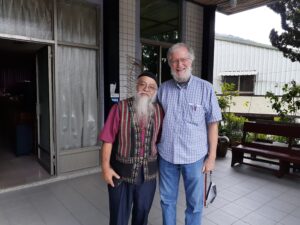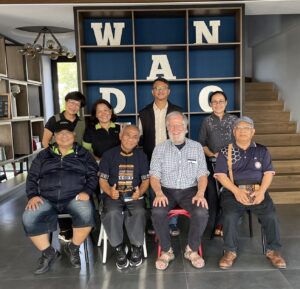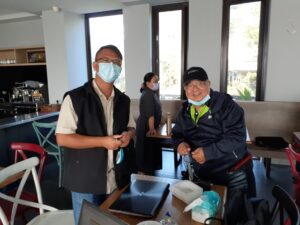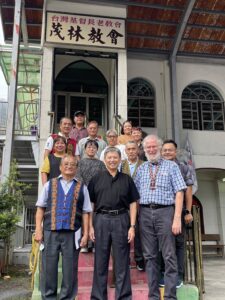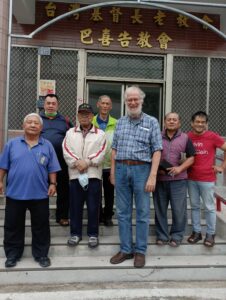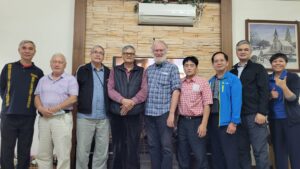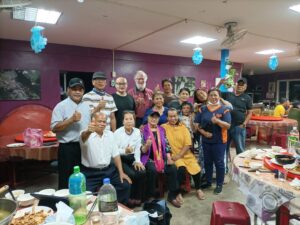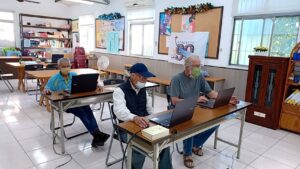The highlight of 2022 for me was my first trip back to Taiwan since March 2020. Covid-19 restrictions in both Canada and Taiwan barred the gates to international travel for over two and a half years. From January to October 2022, I worked the way I had to throughout 2021 using online skype calls and screen-sharing to communicate regularly with the one Hakka and eleven indigenous Bible translation teams I support. Effective though online work has been, there is nothing as refreshing and rewarding as in-person visits with each team in their own context.
I landed in Taiwan on October 26, after a 15½ hour direct flight from Toronto. The journey was longer than usual to avoid flying over Russia (still engaged in its horrific inexcusable war in the sovereign nation of Ukraine) and China (which two weeks earlier extended Xi Jinping’s autocratic rule and applauded his aggressive irrational threats to forcibly take over the free democratic de-facto nation of Taiwan—if only Mr. Xi would learn to live up to his name and be a peacemaker). I flew home from Taiwan on December 2, only to come down with Covid a few days later, caught from a big man sitting beside me who did not mask but coughed and sneezed across the Canadian Arctic.
My 5-6 week visit in Taiwan was wonderful! Though it was different from all my previous visits. I landed shortly after Taiwan’s Ministry of Health had begun its “0+7” Covid policy: 0 days of quarantine, with 7 days of self-monitoring and rapid testing. Like everyone else in Taiwan, I masked all the time throughout my visit. The Bible Society supplied me with masks designed by a friend in the art department: one with 5 loaves and 2 fish, another with Jesus feeding his lambs.
On October 27, I took the train from Taipei to Chung-lak to meet with my dear friends on the Hakka team. I met with them again on my last full working day, December 1. They joked about how they were the alpha and omega of my visit! Together we worked through all the revisions, Hakka phonetics and additional (Hakka = Mandarin) footnotes they had suggested in Genesis to Judges. Our two days together in-person were invaluable, and a joyful time of much mutual encouragement. For some reason everyone looked a bit older and grayer—I guess I did too.
On October 28, members of the Tayal Bible translation team, leaders in the PCT’s large Tayal Presbytery (120 churches!), Rev. Daniel Cheng (BST-GS) and I got together for lunch at the Taipei YMCA. It was a mini celebration for completion of the whole Tayal Bible translation. I was over-joyed to be with dear friends again, especially lead translator Rev. Watan Yawi. He and I worked very hard over skype to complete all the final Paratext checking in 2021 and the final typesetting in early 2022. The Bible Society in Korea is printing the Tayal Bible, but there have been delays due to Covid. We set a date to celebrate and thank God for the new Bible, February 9, 2023, when the Tayal Presbytery will meet at Yu-shan Seminary for its annual spring meeting.
On October 31, I journeyed south by high-speed-rail then east by car to visit the Sediq-Toda team for three days in the central mountains beyond Wu-shr in the village of Snuwil. This was my very first opportunity to visit the whole team in-person and to see the beautiful mountains and valleys where their ancestors have lived for centuries. Their people are famous for their strong opposition to Japanese rule and the policies of forced relocation and “pacification” in the 1930s. Lead translator Rev. Watan Diro and I have been working weekly by skype since May 2021. Watan and one of the reviewers Rev. Peto Nokan and I know each other from previous Paratext training workshops, as well as a BST sponsored trip to Israel in 2019. It was very good to resume in-person friendships with them and to meet for the first time with other ministers and elders on the review team.
The Sediq language can be divided into three dialects: Truku, Tgdaya and Toda. The complete Truku Bible was published in 2005, and the complete Tgdaya Bible in 2020. Watan has nearly finished converting the spelling in the Tgdaya Bible into his Toda dialect. My visit was a catalyst for him and the rest of the team to start reviewing his draft of the entire Toda Bible. We began in Matthew’s Gospel and had good discussions about typical features in Toda grammar which still need some tweaking in the translation. One of the women elders made many good observations to help make the translation a little clearer. We are refining the spelling of biblical names in Toda. The team may need to introduce another sign for the “long-e” vowel. Yet devising a “standard” spelling for this oral language is complicated. Even on this one small Toda team, there are 3 or 4 family-ancestral lines which grew up in different villages and speak Toda with different accents, hence different spellings. The team is developing working methods so that eventual “standard” spellings will be acceptable to everyone who uses the Toda dialect.
From the mountains near Snuwil, coworkers drove me back down to the western plains, south to Chiayi, then into the mountains of beautiful Alishan where I met for three days with friends on the Cou Bible translation team. Joining me for his first visit to the Cou team was Hu Cheng-chieh, a gifted young newly trained Translation Officer with the BST. He got to know some of the Cou team when we visited Israel in 2019. In April 2021, he helped train the newest and youngest member of the Cou team, Evangelist Yapasuyongu. I was delighted to meet Yapasuyongu in-person for the very first time. Though only 30 years old, he already has very good facility in his Cou mother-tongue, as well as being an excellent translator. We thank God for the many contributions he is making in the OT review process.
We used the semantic domain tools in Paratext to standardize some of the Cou translations for various plants, animals and beings in the OT. This was good review for Yapasuyongu and showed the rest of the team how much work remains before we can approve the OT translation. While running other checks, I happened to discover that Matthew 5:13-48 was missing! I was able to determine the date the text was accidentally deleted (six months ago), then restore it to its original form. Some things really are best done in-person! During the evenings and overnight, we enjoyed the generous hospitality of Rev. Shr Ming-siung. We thanked God for letting us resume good times together, eating, praying, laughing, translating, hoping we can complete the Cou OT translation in another year or two.
I met with the Paiwan team for three days, November 7-9, in the southwest coastal town of Dung-gang. Over the past year, our general editor Rev. Kualj had to deal with several severe ailments. After much prayer, he has decided to retire. We shall miss this experienced translator who has been part of the team for the past 10 years. Kualj’s editorial work and Paratext checking will be taken over by senior translator Rev. Tjukar and a new reviewer, Evangelist Langpaw. I spent part of this visit installing Paratext on both of their computers, then giving them each some basic Paratext training. Kualj will continue to coach them as he passes on the baton.
The Paiwan team and I had not met in-person for nearly 3 years, so we did an overview of things we must still do to complete the OT translation and NT revision. We translated a few sections in Ezekiel 45 & 48 and a few verses elsewhere in the OT which had inadvertently been omitted. We discovered that 1 & 2 Chronicles still need a lot of work. When I showed the team the parallel verses in the 10 Commandments recorded in Exodus 20 and Deuteronomy 5, they realized more adjustments had to be made to align them properly. We used the Wordlist and checking tools to make spelling in the OT consistent with the NT. The Paiwan team likes to work together at the same location, so they will continue to encourage and assist one another as they press on to complete the OT translation.
Over the past year, I have met regularly online with the teams translating Mark’s Gospel into three Ngudradrekai dialects: Maolin, Tona and Wanshan. Lead translator for the Wanshan dialect, Rev Liang, will actually complete his draft of all four Gospels by the end of this year. He is making excellent progress! The Maolin team finished Mark and have drafted half of Matthew too. The Tona team is the slowest of the three. They completed Mark just before my visit. I met with the three teams, along with Rev. Daniel Cheng (BST-GS), at the Maolin Presbyterian Church on November 20. It was great to see everyone in-person again! That morning Daniel preached at the Maolin church, while I attended worship at the smaller Wanshan church. The teams hosted us to a delicious traditional Ngudradrekai lunch. During our afternoon meeting, the main topic was typesetting Mark. We still need to improve hyphenation breaks for long words. The BST plans to typeset Mark’s Gospel in the three dialects along with Today’s Chinese Version (TCV2019) in four parallel columns across two open pages. We hope to have all three texts finalized by the end of this year, all the typesetting completed by the end of February 2023, then later in 2023 publish what will be an historic edition of three related indigenous dialects in parallel with TCV2019.
One of my main objectives this visit was to spend a week with the Bunun team, finalizing our translation of the OT and revision of the NT and Short OT (published in 2000). The team and I have been working on this project since the summer of 2012. During Covid, lead translator Rev. Manias and I have met weekly online to do all the Paratext checking. This year he and I completed all the maps for the Bible. I also worked with the BST’s Publishing Department to prepare a draft layout of Genesis with Bunun and TCV2019 in parallel columns. We estimate the whole Bible will be around 2300 pages long.
Unfortunately, a few days before the Bunun team and I were scheduled to meet, we received news from 83-year-old Rev. Manias that his cancer has flared up again. The doctors wanted him to start therapy asap. So we postponed our meeting to Nov 15-18. We met on Nov 15 at Pasikau PC near the east coast rift valley, an hour’s drive from Manias’ home in Yuli. One of the team picked him up and drove him to the meeting. It was wonderful to be with this dear friend and faithful servant of the Lord again in-person, along with our convenor Rev. Sai and a few others. However, we learned that the day before, around midnight, a coworker from the Central Bunun Presbytery tested positive for Covid and could not come. Several coworkers from the Southern Bunun Presbytery could not attend either. As a result, we only met for a few hours. I informed those present that Manias and I have completed all the Paratext checking and that as far as we can tell, the translation is “final” and ready for typesetting. If reviewers still have suggestions to improve the translation, they need to submit them asap. As soon as we enter the typesetting stage, we cannot make any more revisions to the translation. The Bunun team will meet again, December 12-16, when we hope everyone can attend. I will skype and LINE from Toronto to participate remotely as best I can. After the translation is “final,” we hope everyone on the team can fully and joyfully support this new translation and help promote it in all the Bunun churches.
The last time I was with the ‘Amis team was on March 3, 2020, when we praised God for publication of the Revised ‘Amis New Testament, Psalms and Proverbs. Since then, the team has resumed revising the rest of the OT. A northern small group has been checking and revising (where necessary) the spelling of people and place names. A southern small group has been double checking the spelling of common ‘Amis words in the Wordlist. Every few months they meet together to compare notes. I joined the full team, November 21-23.
This visit we worked on several semantic domains. For example, we set more consistent rules for the spelling of names. We made a clearer distinction between related words in ‘Amis for “tribe… clan… family…” by using diagnostic verses where all 3 words occur together. We investigated various OT sacrifices and offerings in order to set standard translations for them all. The terms used in the 1997 ‘Amis Bible were quite good, but the team made a couple of terms even clearer.
November 24-26, I was scheduled to fly to Lanyu (Orchid Island) and visit the Tao team for my very first time. I was accompanied by Huang Lung-kuang, a bright young linguist and Bible scholar who is another newly trained BST Translation Officer. We have been conducting 3-way skype calls between Lanyu, Taipei and Toronto. The team is making small revisions to their 1994 NT and translating the OT for the first time beginning with the Book of Psalms. As it turned out, due to rain and wind, all flights from Taitung to Lanyu were cancelled on Nov 24. Lung-kuang and I caught the morning ferry on Nov 25, and after riding the 2-meter swells arrived safely two hours later. When the first Taiwanese and ‘Amis missionaries visited Lanyu 70 years ago, they typically caught a ride on a simple fishing boat which could take 12 hours or more to arrive!
The Tao team gave us a royal welcome and treated us to flying fish and other seafood delicacies. It was delightful to meet our main coworker Rev. Syan in-person along with his family. His father is convenor of the translation team, while his mother is preparing draft translations of Psalms and Proverbs. We installed Paratext on her computer and gave her an intensive course on how to use the basics. Syan will coach her in our absence. It may be difficult to make regular visits to Lanyu because travel is so unpredictable. We hope to visit again for a whole week in the summer of 2023. In the meantime, we will continue remote skype sessions as best we can. For more details about my visit to the Tao team, please see my blog posted at: https://pccweb.ca/missionblog/2022/12/10/my-first-visit-to-the-tao-bible-translation-team-on-orchid-island-november-25-26-2022/
I reconnected in-person with the Pinuyumayan team, November 28-30, in the beautiful foothills west of Taitung. For much of 2022 we have been meeting via skype (3 times a week!) to run all the checking tools in Paratext for the NT project. Lead translator, Rev. Chang A-syin, is now 82-years old and especially keen to finalize the NT translation. The review team has been a bit slow (one key reviewer ran in Taiwan’s Nov 26 election for township leaders). My visit was a welcome catalyst. We finished reviewing all the NT biblical terms in 8 semantic domains, and almost completed checking all the parallel passages in the NT. We shall see if the team can finalize the NT before my next visit. In the meantime, Rev. Chang has already prepared a draft translation of the entire OT—no small feat! He continues to polish it while waiting for the review team to help finalize the NT.
On December 02, my last day in Taiwan, I was finally able to visit the PCT General Assembly Office and the BST Office. At the PCT-GAO I enjoyed good conversation with Rev. Sudu Tada (PCT Assistant General Secretary) who belongs to the Sediq-Toda people and is a key member of the PCT-GA’s Indigenous Mother-Language Bible Translation Review Committee. I also met the PCT’s Acting General Secretary and several missionary friends. At the BST Office it was good to see GS Daniel Cheng, Lung-kuang and all the staff.
I thank God for his daily grace and mercy, along with prayers and support from the PCC, the PCT, the BST and all my teams, which enables me to serve as a Bible Translation Advisor. May our good and faithful Lord continue to lead each Bible translation team forward and bless everyone who works with us in this life-giving mission work. My next in-person visit to Taiwan is scheduled for February – March, 2023.


